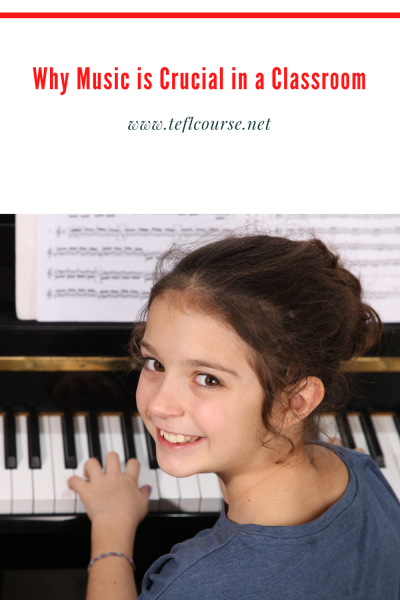Why Music is Crucial in a Classroom

Music is something that nearly everyone in the world enjoys. Music is a universal language. No matter what language you may speak, music is in every corner of the world and every culture. It is one of the many things that can unite people of all places and backgrounds. Because of this, I think music is essential in an English classroom. Especially in a multilingual or multicultural classroom, the students can relate to one another not only through their English knowledge but also through the fact that they like listening to music. If a song is in English, the students might not understand it. However, students can still enjoy a catchy melody or even just the instrumentals behind it while still gaining some kind of knowledge and practice by hearing the English words.
This post was written by our TEFL certification graduate Adriana P. Please note that this blog post might not necessarily represent the beliefs or opinions of ITTT.
Stress Relief
The students in the class know what music is, and more likely than not, they enjoy listening to it. In a class where they might become overwhelmed by new material and foreign words or concepts, a song or two might be the perfect break they need. A stressed student might be able to relieve some of the stress because they are enjoying listening to something. They might be familiar with the song and already like it. That is certain to lighten up the student’s mood even if it is just a little and a happy student is more receptive and motivated to learn.
Also Read: Can I get a work visa to teach English in the Czech Republic?
Teaching Tool
As I stated before, songs should be used as a teaching tool even if students are not familiar with every single word or phrase in them. Even just simply exposing them to an authentic source of material and a potentially different native English speaker than yourself can be very helpful. Their receptive skills can greatly improve if this is done often enough, and maybe eventually they can sing it on their own so that their production skills are also practiced. Students need to work on their receptive skills and there are many ways they can do this. For example, a teacher might read them a story, play an audio conversation between two or more people, or play a video about a specific topic.

Also Read: How much can I earn teaching English in Cambodia?
Distraction
Music, however, might be a lot more interesting for the students than, for example, a conversation about going to the store to buy groceries. There is also the potential for the teacher to include some of the students’ interest in this activity. If there is a certain artist or genre of music the students like, the teacher can play or sing that for them and they will be more motivated to participate in the activity and do it to their best ability.
Also Read: What types of school hire English teachers abroad?
Reminder
Also, music might make certain things easier for some students to understand. Students will probably remember a catchy tune better than a lecture from the teacher. If the chorus of a song features an important grammar topic that they are learning, they will be able to reference the song and might remember the formula for certain things better than trying to remember words on a screen or paper. This can greatly help the students’ performance in some instances.
Do you want to teach English abroad? Take a TEFL course today!
Overall, music is a great tool for teaching. It is something that all students can relate to since everyone in the world has listened to music. It can be used for memorization, simple exposure, or as a fun, stress-reliever. It will not only develop their receptive skills but also eventually their productive skills. Music can be a nice break for everyone from lectures and worksheets, and it could, in the end, really help improve many aspects of the class.
Apply now & get certified to teach english abroad!
Speak with an ITTT advisor today to put together your personal plan for teaching English abroad!
Send us an email or call us toll-free at 1-800-490-0531 to speak with an ITTT advisor today.
Related Articles:
- You're Never Too Old to Change Your Life and Do a TEFL Course
- Top 8 Resources for Researching Teaching English Abroad
- What’s Stopping You from Teaching English Abroad?
- 5 Reasons Why You Should Consider Russia for Teaching English Abroad
- How Learning A Foreign Language Made Me a Better ESL Teacher
- 5 Awesome Ways to Lead a Lifestyle as an English Teacher




